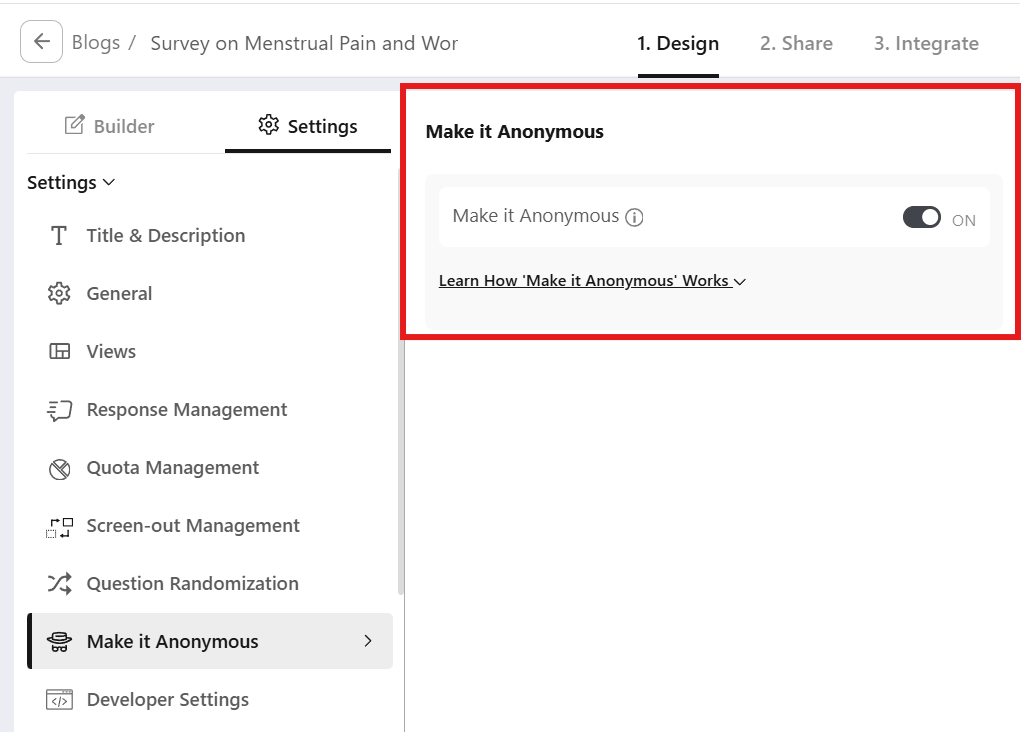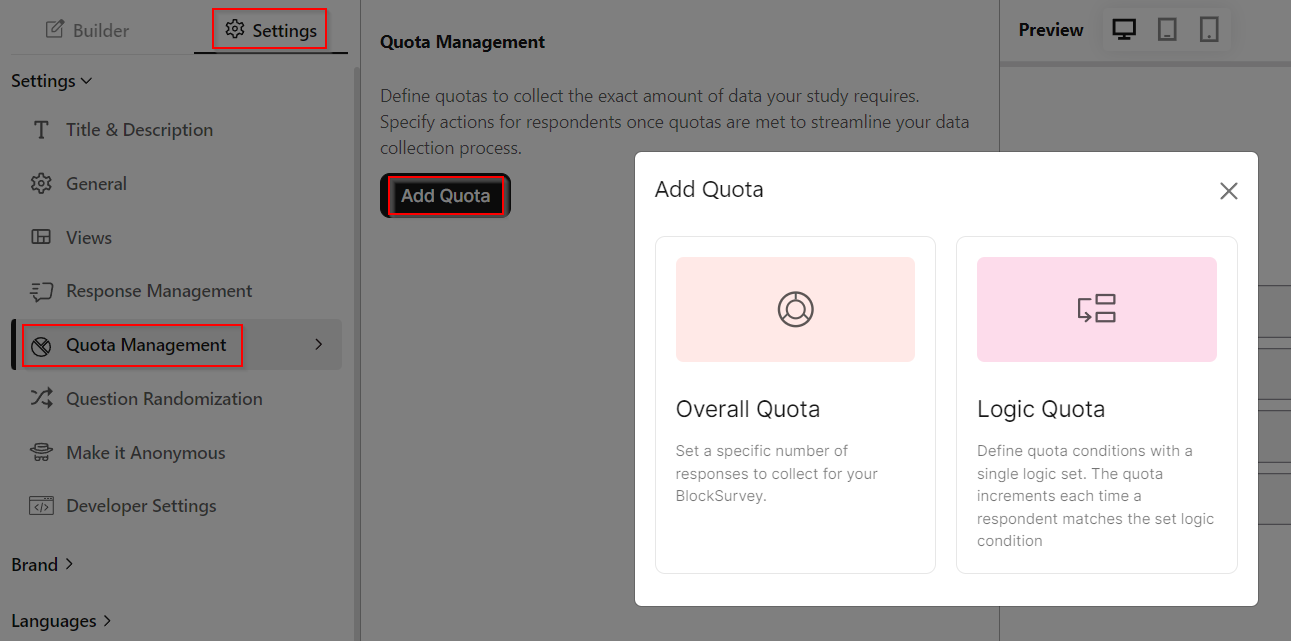Get insights.
Unlock value.
- 14-day free trial
- Set up in minutes
- No credit card required
Struggling to get honest answers? - Design Anonymous Surveys for Mental Health Stigma Research with BlockSurvey
Stigma, by its very nature, thrives in a cycle of silence. To break this cycle, especially in mental health-related research, researchers need a tool to collect honest, unfiltered insights from the participants. But how do you collect such sensitive data without fear of being exposed?
“My depression is causing me physical pain … I don’t know how to stop it.”
“I’m afraid if I ask for help … I’ll get called dramatic.”
These are posts from Reddit, where people pour their hearts out, sharing raw, unfiltered accounts of their mental health battles. This is a strong signal from the secondary data for mental health research, which exposes that - People still feel stigmatised about disclosing their mental health.
So how to create a safe space where individuals could share their experiences without fear of judgment or exposure. This is where 'Anonymous surveys' come in.
Let’s explore how you can design anonymous surveys for mental health stigma research and how BlockSurvey helps dismantle the stigma barriers and ensures the quality of data collected.
The Real Dangers of Mishandling Mental Health Stigma Research
Unlike any other research, it’s not just about flawed data. It’s about real people, real lives being affected in ways that can ripple through communities, healthcare systems, and even generations.
Poor Quality of Data
The fear of being exposed, or biased can lead to flawed, incomplete, or compromised data. It won't yield anything fruitful out of the research being done. And the stigma? It remains unchallenged.
Eroding Trust
When the sensitive data collected has been breached and exposed leads to the violation of participants' privacy and of course, trust is shattered. Not just in the study, but in the entire research process.
How can we fight mental health stigma if the very tools we use to study it perpetuate the fear of exposure?
Legal and Ethical Fallout
Mishandling sensitive data isn’t just an ethical failure, it’s a legal minefield. HIPAA violations can result in fines of up to $50,000 per incident, not to mention the irreversible damage to a researcher’s reputation.
Reinforcing the Stigma We’re Trying to Break
Poorly conducted research can reinforce the stigma it aims to dismantle. For example, a study on workplace mental health stigma reveals that employees fear discrimination in the workplace if they openly speak up about the effect of work pressure on their mental health.
But if the responses are leaked, those fears are validated, and they might be discriminated against by their superiors because of their responses. The stigma isn’t just studied it is reinforced.
Design an Anonymous survey to extract the unfiltered data
To run a mental health stigma survey is like asking people to shine a light on their most vulnerable experiences. But remember no one wants to stand in the spotlight when they fear judgment, rejection, or exposure.
But that ‘vulnerable experience’ is the data that you are looking for to bring the highest quality of insights from your research.
The primary solution to extract that unfiltered response lies in ‘Anonymity’, which creates a safe space.
When people know their responses are completely anonymous, they’re less likely to give answers they think are “acceptable” or “expected.” Instead, they share their real experiences, even if those experiences are messy, uncomfortable, or painful.
How to create an ‘Anonymous Survey’?
There are many traditional tools available today to create surveys, but BlockSurvey stands out among them as an absolutely anonymous survey software, especially for handling sensitive data.
You clearly know that you want to run your survey anonymously. But how will you communicate that to your participants, the only way is your choice of tools to enhance the anonymity of your data collection.
A tool like BlockSurvey, just makes it easy by keeping participants' data encrypted and stored with absolute privacy. Let’s have a quick run-through on the BlockSurvey’s features that bring in anonymity and increase the quality of research.
Anonymous Seal
BlockSurvey has a Make it Anonymous feature by turning it on, you can create a completely anonymous survey. By making your survey anonymous you cannot ask your respondents for Personal Identifiable Information (PII) like email address, phone number, country, etc.
Step 1: Create your mental health survey in BlockSurvey.
Step 2: Turn on the ‘Make it Anonymous’ feature.
Step 3: Share it with your Participants
Yes!! Creating an anonymous survey is that simple.

Additional Features of BlockSurvey that enhances your Research Data
HIPAA Compliant
BlockSurvey is a HIPAA-compliant survey tool designed to securely collect sensitive health information while ensuring patient privacy and protecting PHI. By using BlockSurvey, healthcare data collection is made more confidential and gathers valuable insights without compromising compliance or trust.
End-to-end encryption
BlockSurvey is a Zero-Knowledge platform built with a privacy-first approach. All the data are encrypted in transit and also at rest. This adds up to the maximum level of security for your sensitive data.
Quota Management
Mental health stigma research often requires diverse participant pools to ensure representation across age or gender. If you need equal numbers of men and women to understand gender-based stigma, quota management ensures you don’t end up with skewed data.

Screen-out Management
Not every participant will fit your research criteria. Screen-out management allows you to filter out irrelevant respondents early in the survey, saving time and resources. For mental health stigma research, this ensures only those with relevant experiences or perspectives are included.
If you’re studying stigma among individuals with diagnosed anxiety disorders, screen-out questions can exclude those without relevant experiences, ensuring focused and meaningful data.
Use Cases
1. How Anonymity uncover honest insights into Cultural Stigma
Let’s take a University research team that wants to study ‘How cultural beliefs and practices contribute to mental health stigma in a specific ethnic community’.
The main challenge is participants may fear judgment from their community or feel uncomfortable discussing sensitive topics openly.
Value for Researchers
Honest data: An anonymous survey using BlockSurvey, ensuring participants can share their experiences without fear of exposure that yields quality responses.
Increased Participation: By removing the fear of judgment, BlockSurvey helps researchers reach a wider audience, even in communities where stigma is deeply entrenched.
The data collected can be used to design targeted interventions that address the unique challenges faced by specific cultural groups.
2. Unmasking Self-Stigma: Empowering Youth Through Anonymous Insights
A youth-focused mental health NGO aims to understand the prevalence and impact of self-stigma among young people experiencing mental health challenges. They want to identify key areas where self-stigma manifests and develop targeted interventions.
The main challenge here is young people often internalize negative stereotypes about mental illness, leading to shame, reduced self-esteem, and reluctance to seek help. They may fear judgment, bullying, or social isolation if they disclose their struggles
Solution with BlockSurvey
Unfiltered response: Anonymous surveys encourage youth to share their true feelings and experiences related to self-stigma.
Targeted Intervention Development: The data helps the NGO identify specific areas of self-stigma that need to be addressed in their programs and resources.
Increased Engagement: Anonymity increases participation rates, especially among youth who might otherwise be hesitant to disclose their struggles
Balanced Insights: To ensure the data reflects the diversity of the youth population, BlockSurvey’s quota management feature allows the NGO to collect responses from the specific age groups.
Break the stigma using BlockSurvey
Mental health stigma thrives in silence, but you can break using anonymous surveys. With BlockSurvey, researchers have a powerful, secure tool to collect the honest insights they need without compromising participant privacy or compliance.
BlockSurvey is your partner driving the change towards sensitive data collection, Start your journey today or Book a Demo.
Struggling to get honest answers? - Design Anonymous Surveys for Mental Health Stigma Research with BlockSurvey FAQ
Why is it important to design anonymous surveys for mental health stigma research?
Anonymous surveys help ensure participants feel comfortable sharing their honest thoughts and experiences without fear of judgment or repercussions.
How to write sensitive questions for mental health stigma survey?
Use neutral, non-judgmental language and avoid leading questions. BlockSurvey’s skip-logic and branching features let you tailor follow-up questions to avoid overwhelming participants.
How can I boost participation rates for stigma-related surveys without compromising anonymity?
Highlight BlockSurvey’s anonymity features upfront in your survey invite. Use concise, empathetic language and assure participants their responses are confidential key for building trust in stigma research.
Is BlockSurvey compliant with regulations like HIPAA for mental health research?
Yes! BlockSurvey is HIPAA-compliant and GDPR-ready, ensuring sensitive mental health data is stored and managed securely, meeting global privacy standards.
Get insights.
Unlock value.
- 14-day free trial
- Set up in minutes
- No credit card required

